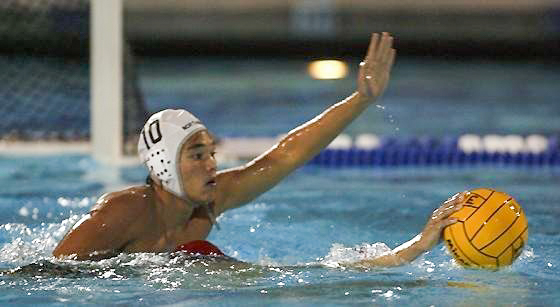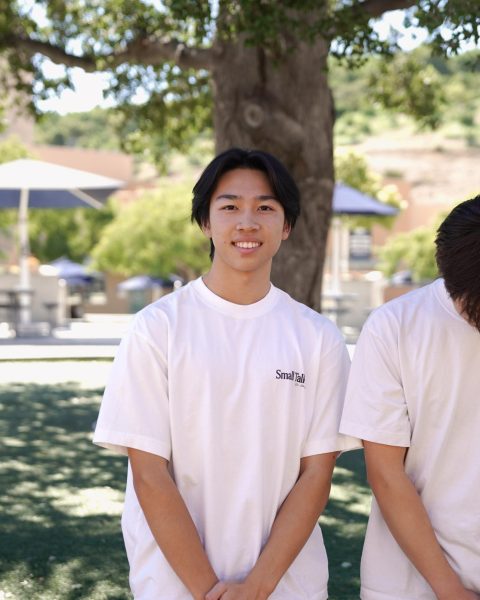What happens when the student becomes the teacher? Kyle Kim-E, a Class of 2010 alumnus and former varsity boys water polo captain, returned in 2015 as a coach and has been leading the team to success ever since.
We sat down with Kim-E to discuss the evolution of the sport, the players and Northwood itself.
The Howler: Was there any specific experience from your time as an athlete that made you want to come back and coach water polo?
Kyle Kim-E: I’ve always really loved the teammates that I had when I was here playing at Northwood. When the job first opened up, the program had been going through a lot of different coaches, and I was realizing that we had lost stability in the program. I hadn’t really considered coaching at the high school level; I was just doing club, and I had some parents that I knew reach out to me and say, “Look, would you be willing to come in, even if it’s only for just a season?” I didn’t have plans on coaching long term, but fell in love with it. It reminded me why I love Northwood so much, and that’s actually why I pivoted to education. This is my 10th year coaching, but it’s only my sixth year teaching, because I started as a coach first.
TH: How has your experience as a player or coach affected the way you teach?
KK: There are strategies that I can bring from coaching into the classroom or vice versa. Coaching is something that I really love to do, and it’s definitely something that motivated me to teach in the classroom. It’s fair to say that my roles as a teacher come first now. So that’s been a really fun growth for me.
TH: How has the water polo team changed from when you were a student athlete to now?
KK: Every year is slightly different. When I was playing, we had almost every person on our team go play collegiately, so that’s a different level of competitiveness. We actually won a state championship in 2006, and I also played in back to back division one CIF finals. During that time period from 2006 to 2008, we were one of the best teams in the nation. But I do think that the changes have just naturally occurred over time. Not as many athletes are committed to playing in college, which is okay, but I do think that that creates a different dynamic on the team. When I first joined as a coach, the goal was to bring stability, and even though we aren’t as competitive compared to those years, our boys program made division two this year. The stability—if we’re able to allow our student-athletes to participate in all the extracurriculars that they want and still create a program that is competitive within D2 or D3 or maybe even D1—is the success we’re trying to bring forward.
TH: Are there any other ways that being a coach has changed your perspective or mindset on the sport or Northwood in general?
KK: As a coach, I’ve learned to understand that my playing experiences are not going to be the same as the playing experiences nowadays. Back then, we were all 100% in for water polo and nothing else. Everyone only committed to water polo. But I think what I’ve learned to appreciate and really enjoy is seeing how well-rounded everyone is in a bunch of different things. It’s really cool when I go to a football game and I see athletes that we have in the marching band, for example, or I get to go watch people from our sport compete in wrestling or basketball. There are guys and girls that are dual-sport athletes. As a coach, I’ve learned to really appreciate the well-roundedness, whereas I didn’t always see that as a player.
TH: Have any coaches that you had at Northwood impacted the way you approach coaching yourself?
KK: Absolutely. My first year as a freshman here, when we won the state championship, it was Steve Carrera and he went on to coach at the collegiate level, and then actually his brother Ed ended up being our coach next. So I learned a lot from them as a player. Not every coach is perfect, and I also acknowledge that—even myself as a coach is not perfect—but I like to think that everyone tries to take the positive experiences that they had with each coach and what worked and what didn’t work, and we just try to develop it in our own way. The culture and the competitiveness they were trying to accomplish at Northwood during that period is something I’ve definitely tried to bring back.
TH: What’s the most valuable advice you’ve learned over your years as a player and coach that you would share?
KK: Resilience and perseverance. All sports are really tough, but water polo is one where you have to know how to swim and you have to react to a lot of different things. It’s usually dubbed as one of the most difficult sports in the world. But I think that it naturally builds up a lot of resilience. Four hours on a Saturday is not everyone’s favorite thing, but I do think it teaches you a lot about camaraderie and how everyone is making sacrifices for the best of the team. You’re committing to something that is for the greater good, and even though a lot of guys don’t play at the next level in college, they can still take that resilience and perseverance into their future jobs because I think it’s an important life skill to have.




















































